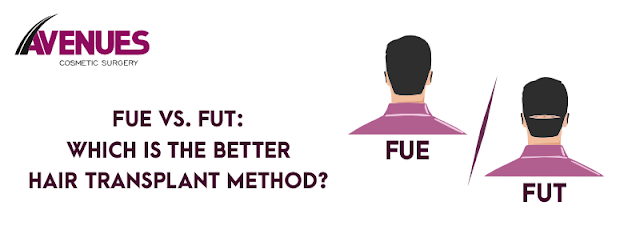FUE vs. FUT: Which Is the Better Hair Transplant Method?
You are not alone if you are thinking about getting a hair transplant to restore your losing hair. The most recent data indicates that roughly 40% of women and 85% of men have hair loss, and hair restoration provides the opportunity for a fuller head of hair.
Follicular unit excision (FUE)
and follicular unit transplantation are two well-liked methods for
transplanting hair (FUT). Both hair restoration procedures can give you
naturally thicker, fuller hair, but there are important distinctions between
them.
If you're thinking about getting
a hair transplant, keep reading to find out how FUE and FUT transplants differ
from one another and which offers the greatest outcomes.
FUE Hair Transplant
Each follicular unit is removed
from your scalp during an FUE hair transplant from the donor region. These hair
follicles are prepared for implantation and then implanted into the bald or
thinning parts of your scalp. The region of the scalp receiving the donor hair
follicles must be shaved by the patient.
The technique doesn't leave a
visible scar, making it perfect for people who now have shorter hair or may in
the future. Although some redness and discomfort are expected, most
patients report little to no pain following treatment.
FUT Hair Transplant
In contrast to FUE hair
transplants, the surgeon uses FUT to remove a straight strip of your scalp from
the donor area. After that, the strip is divided into portions and prepared for
implantation into the areas that are thinning or balding.
The donor region does not need to
be shaved with FUT, although patients do have a single, extensive scar across
their head. For these reasons, patients who don't desire a significant change
in their look and have longer hair (which might hide the scar) frequently chose
FUT.
Which Hair Transplant is more successful?
Since both use the same approach
to implant the hair follicles at the recipient location, they are both equally
effective and efficient in promoting hair growth, making it impossible to
distinguish between them.
Regardless of the methodologies, choosing a method also requires consideration of other considerations. As follows:
- An individual's age
- Hair loss severity over the scalp
- Availability of hair from donors
- The patient's mindset
The surgeon must weigh all the
information before determining what course of action is best for the patient.
One approach does not work for everyone. So a patient choose a clinic which can
perform all methods.
Things to Consider
- Rarely, when the scalp is extremely thick or the hairs are delicate, Fue may not be an option and FUT may be required.
- To get the required number of grafts in really big instances, it could be essential to combine the two techniques.
- Fut is pretty simple to replicate. A second Fut or Fue can be performed after the first Fut in the first sitting. Taking more than 3000 grafts simultaneously during Fue is dangerous, and a second sitting may not be viable.
Cost of Hair Transplant
Due to the unique extraction and
implantation of each hair, FUE hair transplants often have greater costs. The
quantity of implantations needed for a patient will determine how much the
surgery will cost. Costs may range from $4,000 to $15,000. FUT hair transplants, on the other hand, cost between $4,000 and $10,000.
Wrapping up
We believe that FUT is the ideal
procedure for people in India who have a restricted budget since it is less
expensive, more convenient, and produces excellent outcomes.
Despite this, many patients who
are wary of the FUT process due to "skin being removed" are drawn to
FUE. FUE can be performed on such patients, as well as those who want short
hair, are financially stable, and have a little amount of balding, up to
roughly 2000 grafts.
FUT is preferable after 2000
grafts; if the patient still wants FUE, FUE must be combined with body hair.
Body hair in our opinion is inferior to scalp hair and is thus advised only
when scalp hair is not accessible.



Comments
Post a Comment